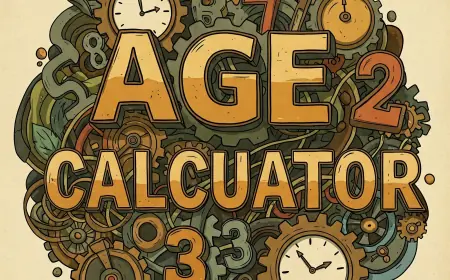How Is AI Humanization Shaping the Future of Digital Marketing in 2025?
Discover how AI humanization is transforming digital marketing in 2025. Learn how humanizing AI enhances content creation, improves customer engagement, and boosts conversions by making AI-generated content more relatable, authentic, and effective for modern businesses.
In 2025, artificial intelligence (AI) is no longer just a tool for businesses to streamline operations and automate processes—it has evolved into a powerful resource for content creation, customer engagement, and marketing strategy. As AI tools become more integrated into digital marketing efforts, one challenge remains: ensuring that AI-generated content connects with human audiences. This is where humanize AI technology steps in, offering businesses the ability to create content that feels authentic, empathetic, and deeply connected to their customers.
The Rise of AI Humanization in Digital Marketing
AI-powered tools have revolutionized digital marketing by improving the speed and efficiency of content production, customer interactions, and campaign optimizations. However, one of the key limitations of AI is its inability to convey the emotional nuance, warmth, and relatability that human communication typically carries. In many cases, AI-generated content can feel robotic or disconnected from the audience’s needs, limiting its effectiveness in marketing. This is where the importance of AI humanizers becomes clear.
AI humanization is the process of refining and enhancing AI-generated content so that it sounds more natural, relatable, and human-like. By using humanize AI writing techniques, marketers can ensure that their content is engaging, resonates with the audience, and improves key metrics such as conversion rates and customer loyalty. As the marketing landscape evolves in 2025, the ability to humanize AI content will become a fundamental aspect of any successful digital marketing strategy.
Why AI Humanization Matters in Digital Marketing
Businesses are increasingly relying on AI tools to generate content, run campaigns, and engage with customers. However, there’s a significant risk that this content may fail to connect with audiences if it lacks a personal touch. Here are some key reasons why humanizing AI is crucial for modern digital marketing:
1. Building Authentic Connections with Customers
In today’s highly competitive digital landscape, customers expect more than just efficient service—they want to connect with brands that feel real, relatable, and understanding. Traditional, robotic AI-generated content often fails to meet these expectations, which can damage a brand’s image and reduce engagement rates. By leveraging humanized AI, businesses can create marketing materials that feel more authentic and personal, building trust and forming stronger connections with their audience.
2. Improving Conversion Rates
One of the key goals of digital marketing is to convert potential customers into paying ones. AI humanizer tools help ensure that AI-generated content resonates with the audience in a way that drives action. Whether it’s through persuasive email campaigns, engaging blog posts, or captivating social media posts, humanized AI content has been shown to improve conversion rates by speaking directly to customers’ emotions, needs, and desires.
3. Enhancing SEO and Keyword Optimization
While AI can generate content quickly, it often lacks the depth and nuance needed for optimal SEO performance. AI-generated articles may miss subtle keyword placements or fail to provide the necessary context for search engines to fully understand the content. By using humanizer tools, businesses can ensure that their AI-generated content is not only readable and engaging but also optimized for SEO. This helps businesses achieve higher rankings on search engines and drive more organic traffic.
4. Bypassing AI Detection Tools
As AI-generated content becomes more widespread, platforms and search engines are developing sophisticated tools to detect and flag content created by machines. These tools often penalize AI content, which can be detrimental to businesses relying on automation for content creation. AI detector humanize techniques allow businesses to refine AI-generated content so that it bypasses detection algorithms while maintaining its quality and relevance.
Key Areas Where AI Humanization is Impacting Digital Marketing
AI humanization is already having a profound impact across various aspects of digital marketing. Here are a few key areas where humanize AI tools are making a difference:
1. Social Media Marketing
Social media platforms are one of the most important channels for engaging with customers in the digital age. However, AI-generated posts can often sound stiff and inauthentic, failing to capture the conversational tone that people expect from their interactions on social media. By humanizing AI content, businesses can create posts that feel more personal, relatable, and engaging. Whether it’s for Facebook, Instagram, Twitter, or LinkedIn, humanized AI content can help brands develop a voice that resonates with their audience, leading to increased engagement and brand loyalty.
2. Personalized Email Marketing
Email marketing remains one of the most effective digital marketing strategies for driving conversions. However, AI-generated emails can often feel impersonal or mechanical. To create truly personalized and engaging email campaigns, businesses need to humanize AI writing. Humanized email content feels more natural, personalized, and conversational, which encourages recipients to open the email, read the message, and take action. By using AI tools to personalize the tone, structure, and language of email campaigns, businesses can increase the chances of a positive response from their customers.
3. Content Marketing
Content marketing—whether it’s in the form of blogs, articles, or long-form content—is a cornerstone of modern digital marketing strategies. However, AI-generated content can sometimes lack depth and emotional engagement. By using humanized AI writing tools, brands can create more compelling and persuasive content that not only educates but also connects with the audience on an emotional level. Humanized content resonates more deeply with readers, increasing the likelihood of conversions and driving long-term customer loyalty.
4. Paid Advertising
AI tools have already been used to optimize paid advertising campaigns across platforms like Google Ads, Facebook Ads, and Instagram. However, humanize AI content can take these campaigns to the next level. By making ad copy more engaging and conversational, businesses can improve the effectiveness of their paid campaigns, driving higher click-through rates (CTR) and better return on investment (ROI). AI-driven tools allow businesses to target specific customer segments with personalized ad copy, ensuring that the message feels relevant and authentic to each group.
AI Humanization in Regional and Cultural Contexts
As digital marketing becomes more global, businesses must consider the cultural and regional nuances that shape customer behavior and preferences. The rise of AI Filipino humanizer tools is a perfect example of how AI can be adapted to create culturally relevant content. By understanding local dialects, customs, and consumer behaviors, these tools help businesses tailor their messages to specific markets, ensuring that content feels authentic and relatable to diverse audiences.
Humanize AI tools can also be used to refine content for different languages and regions, enhancing the overall customer experience and ensuring that marketing efforts resonate with local audiences.
How to Effectively Use AI Humanizers in Digital Marketing Strategies
To take full advantage of AI humanization in digital marketing, businesses must invest in AI tools that prioritize content personalization, cultural adaptation, and emotional intelligence. Here are some best practices for integrating AI humanizers into marketing strategies:
-
Invest in High-Quality AI Writing Tools
AI-powered tools that incorporate humanize AI features are essential for businesses looking to produce content that resonates with their audience. Investing in these tools ensures that AI-generated content is optimized for readability, engagement, and SEO performance. -
Focus on Emotional Intelligence
To create content that truly connects with customers, AI needs to be able to understand and respond to human emotions. Humanized AI technology enables AI tools to analyze sentiment, tone, and context, ensuring that content feels more personal and empathetic. -
Localize Your Content
As businesses expand globally, it’s essential to adapt marketing content to the specific cultural and regional contexts of different markets. By leveraging AI to humanize, businesses can create culturally relevant content, which improves its impact and effectiveness.
The Future of AI Humanization in Digital Marketing
The future of AI humanization in digital marketing is bright. As AI tools continue to evolve, the focus will shift towards creating even more personalized, emotional, and context-aware content. In the coming years, AI-powered marketing will be increasingly humanized, enabling businesses to build deeper relationships with customers and drive greater success.
Conclusion
In 2025, AI humanization will continue to be a game-changer for digital marketing strategies. By integrating AI humanizer tools into their content creation processes, businesses can create marketing materials that are not only efficient but also authentic, engaging, and highly effective. From social media to email campaigns, AI humanization will play a crucial role in helping brands connect with their customers on a deeper level, ultimately leading to higher engagement, improved conversion rates, and stronger brand loyalty.
What's Your Reaction?
 Like
0
Like
0
 Dislike
0
Dislike
0
 Love
0
Love
0
 Funny
0
Funny
0
 Angry
0
Angry
0
 Sad
0
Sad
0
 Wow
0
Wow
0























































